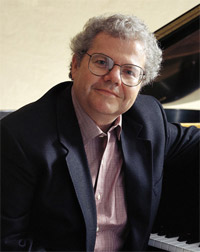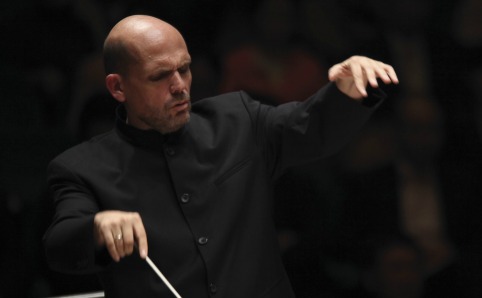Classical Concert Review: Emmanuel Ax and the Boston Symphony Orchestra/Jaap van Zweden at Symphony Hall
To judge from the all-around energetic playing of the BSO, it seems conductor Jaap van Zweden has struck a good rapport with the players and I, for one, look forward to hearing more from him in coming seasons.
By Jonathan Blumhofer

Pianist Emmanuel Ax — as a pianist, he is perfectly at home in this repertoire, though there was never a sense of complacency in his performance.
Two old favorites made welcome returns to Symphony Hall last weekend: Beethoven’s Piano Concerto no. 2 (not heard since 2001) and Rachmaninov’s Symphony no. 2 (not heard since 2002) shared billing in a concert that featured pianist Emmanuel Ax and the Boston Symphony Orchestra (BSO) led by conductor Jaap van Zweden.
Mr. van Zweden, who is music director of the Dallas Symphony, was making his Symphony Hall subscription debut, having first conducted the BSO at Tanglewood last summer. To judge from the all-around energetic playing of the orchestra, it seems he has struck a good rapport with the players and I, for one, look forward to hearing more from him in coming seasons.
Rachmaninov’s Symphony no. 2 is rightly famous for its melodic bounty: the Soviet critic Konstantin Kuznetsov went so far as to call it the “Russian Lyric Symphony—so direct and sincere are its themes, and so naturally and spontaneously do they develop.” And, indeed, there was plenty of lyrical, spontaneous-sounding playing during Saturday’s performance. However, this lyrical abundance presents some serious musical challenges, not the least of which is making dramatic sense out of four movements that are filled with long stretches of relatively similar melodic material. Nowhere is this predicament more apparent than in the slow third movement, where Rachmaninov builds tension less through contrasting musical material than by juxtaposing related motives through different instrumental textures.
Happily, on Saturday night Mr. van Zweden and the BSO were wholly in their element, giving about as captivating a performance of this sprawling, 50-minute-long symphony as one might hope to hear. On the whole, tempos were brisk, but this is music that can benefit from some speed lest it settle into a complacent muddle. If, in this reading, the opening movement lacked a bit of its inherent mystery, the BSO more than made up for it with sumptuous tonal color. It was, indeed, refreshing to hear the orchestra—particularly the low strings and brass—making the most of Rachmaninov’s wholly idiomatic writing in this movement, while the numerous instrumental solos were dispatched with sensitivity and élan.
The diabolical second movement Scherzo, in a word, cooked. Though there was a somewhat ragged start to the string fugato that begins around its midpoint, Mr. van Zweden’s confident direction assured that there was nothing serious to worry about. The BSO was perfectly comfortable with the movement’s character, the brass nicely emphasizing their clarion calls and the percussion reveling in their several, colorful moments in the spotlight.
All too often I’ve heard performances and recordings of the third movement that make its opening section (beginning with the clarinet solo) the focal point and relegate the subsequent 10 minutes or so of music to some sort of follow-up role. Not in this performance: Mr. van Zweden gave the movement a coherent shape with some beautifully wrought climaxes and fine solos from Elizabeth Rowe (flute), William Hudgins (clarinet), Richard Svoboda (bassoon), and James Sommerville (horn). The closing measures, especially, were magical, tapering off with one of the most delicate decrescendos heard at Symphony Hall this season.
The hyperkinetic finale was agreeably energetic, even if it presented a couple of balance issues (most notably the brass overwhelming the rest of the ensemble a bit towards the end of the piece). Still, it’s rather petty to complain about such little things in a performance like this one: Mr. van Zweden truly had the BSO playing as one, and their reading was thoroughly invigorating.
In the concert’s first half, Mr. Ax, making his first appearance on the BSO subscription series since 2010, gave a satisfyingly robust performance of Beethoven’s Second Piano Concerto. Though published as “no. 2,” the present concerto actually predates the First Piano Concerto and owes much to the concerti models of Mozart and Haydn. Beethoven evidently didn’t think too highly of the piece (“I do not claim [it] to be one of my best,” he wrote his publisher), though the fact that he spent eight years intermittently working on it might have jaded him somewhat to its charms. Still, it is the least regularly performed of the Beethoven piano concertos and only made its BSO debut in 1947 (and that performance was in New Haven—it wasn’t until 1953 that the piece was heard at Symphony Hall!).

Conductor Jaap van Zweden — he truly had the BSO playing as one, and their reading was thoroughly invigorating.
On Saturday night, energy and textural clarity were the name of the game. As in the Rachmaninov, Mr. van Zweden kept things moving along at a nice clip, especially in the outer movements. He was aided in his brisk tempos by a reduced contingent of orchestral strings that gave this reading a lightness of touch and allowed for a real chamber music quality to develop as the piece progressed. Through it all, the character of the music came across strongly: a majestic, martial opening movement; an appropriately weighty but lyrical second movement; and a droll, off-kilter finale in which Beethoven’s debt to Haydn is most evident.
For his part, Mr. Ax brought a fine sense of structure and sensitivity to the extended solo part. As a pianist, he is perfectly at home in this repertoire, though there was never a sense of complacency in his performance. Most notable were the strikingly clear textures with which he imbued his playing. Though this isn’t the knottiest Beethoven concerto, Mr. Ax’s articulation of the melodic writing was breathtaking, particularly in the slow second movement that unfolded rhapsodically.
If you missed Mr. Ax’s performance this time around, don’t worry: he’s coming back to Boston once more this season (though not with the BSO). In May he presents what should be a gripping recital of pieces by Copland, Haydn, Beethoven, and Schumann at Jordan Hall. As for Mr. van Zweden, well, let’s hope the BSO brings him back soon—after this weekend, he’s more than earned a return engagement.

We, the Dutch lovers of classical music, know already for a very long time: Jaap van Zweden is a very great conductor. We hope that the USA does not keep him too long; The Concertgebouw Amsterdam is waiting for him! And we are glad that he is sill conducting with the Radio Philharmonic Orchestra. We are very proud of Jaap van Zweden!!